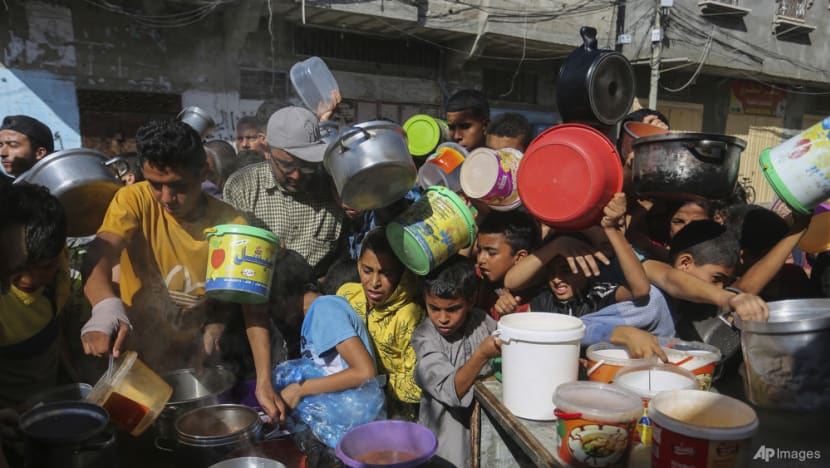Humanitarian situation in Gaza dire, with no safe zones for civilians to flee to: Former UN special rapporteur
Global aid organisations are calling for a sustained ceasefire amid the deteriorating humanitarian situation in Gaza.


This audio is generated by an AI tool.
The humanitarian situation in Gaza is dire, and there are no safe zones in the Palestinian enclave, said Professor Michael Lynk, a former United Nations (UN) special rapporteur on human rights in the occupied Palestinian territory.
Global aid organisations are calling for a sustained ceasefire amid the deteriorating humanitarian situation in Gaza, warning that civilians are running out of places to flee to.
On so-called “safe zones” for civilians in the Gaza Strip to flee Israeli bombing, Prof Lynk said these are areas “with absolutely no facilities to be able to handle hundreds of thousands or even more than a million Palestinian refugees”.
“There's no place to be able to feed them, to give them water, to provide sanitation, (and) to provide any sort of shelter now that we're approaching the Mediterranean winter,” he told CNA’s Asia First on Wednesday (Dec 6).
“We have almost 2 million people concentrated in the far south, in the midst of heavy fighting, with the Israeli army coming south and most of the Hamas battalions still in place and ready to fight them.”
"BOTH SIDES VIOLATING INTERNATIONAL LAWS"
Dr Kristian Coates Ulrichsen, a fellow for the Middle East at Rice University's Baker Institute for Public Policy, said: "Even if they are able to shift from one location to another, it doesn't really make a difference in terms of overcrowding and the desperate humanitarian conditions."
He told CNA938 on Wednesday: “I think the concern is that nowhere in the Gaza Strip is potentially secure and safe.”
Fighting between Israel and Hamas resumed on Friday, after a brief seven-day pause to exchange hostages and prisoners and deliver humanitarian aid.
International laws may have been breached by both sides in the conflict, said Prof Lynk, who is professor emeritus of law at the Western University in Canada.
“It's a war crime to capture civilians and to hold them as hostages," he said, adding that Israel's arrest and detention of Palestinian children also flouts international laws.
Israel is retaliating for an Oct 7 attack by Hamas, which it says killed some 1,200 people.
Its military offensive has since claimed the lives of more than 16,000 Palestinians in the enclave, according to Gaza’s health ministry.
Meanwhile, most of the hospitals in Gaza are no longer functional, due to damage or shortages, said Prof Lynk.
“Their staff have been forced to leave by Israeli troops moving south in Gaza. There are no supplies, there are no anaesthetics, there are no drugs. There's very little ability for these hospitals to operate,” he noted.
“The only ones that are partially operating now and which received some humanitarian care in terms of medical equipment are those in the far south.”
CIVILIANS HAVE NOWHERE TO GO
Since Israel’s campaign started, some 80 per cent of Gaza's 2.3 million residents have been driven from their homes, with most of them fleeing south.
The crowded southern areas are now sheltering triple their usual population.
Experts said the overcrowding makes the humanitarian situation even worse, as residents are not able to get the aid that they need promptly.
Israel has reported that its forces on Tuesday reached the heart of Khan Younis in southern Gaza and also surrounded the city.
Dr Ulrichsen said this is an indication that the Israeli operations, which were initially in the north of the Gaza Strip, “have failed to achieve complete dominance over the territory”.
“As the Israeli leadership continues to encounter very stiff resistance from Hamas, they will conclude that they have to extend operations throughout the strip,” he added.
“If that is the case, then for the Palestinian communities and the civilian population, they have nowhere to go.”
United States officials expect the current phase of Israel’s ground invasion of Gaza to end by January, according to reports.
Related:
Dr Ulrichsen believes this signals to the Israeli political and military leadership that the war “cannot be open-ended”.
“There's been a lot of US pressure expressed over the recent weeks that Israel has to have an end game,” he said.
“And I think coming out in public with a specific window and timeframe is really a way of putting the Israeli leadership on notice that this has to come to that at some point.”
He added that Washington is concerned that Israel does not have a plan for what comes next, and is resisting efforts by international partners “to try and identify a political day-after solution” to a seemingly open-ended conflict.














